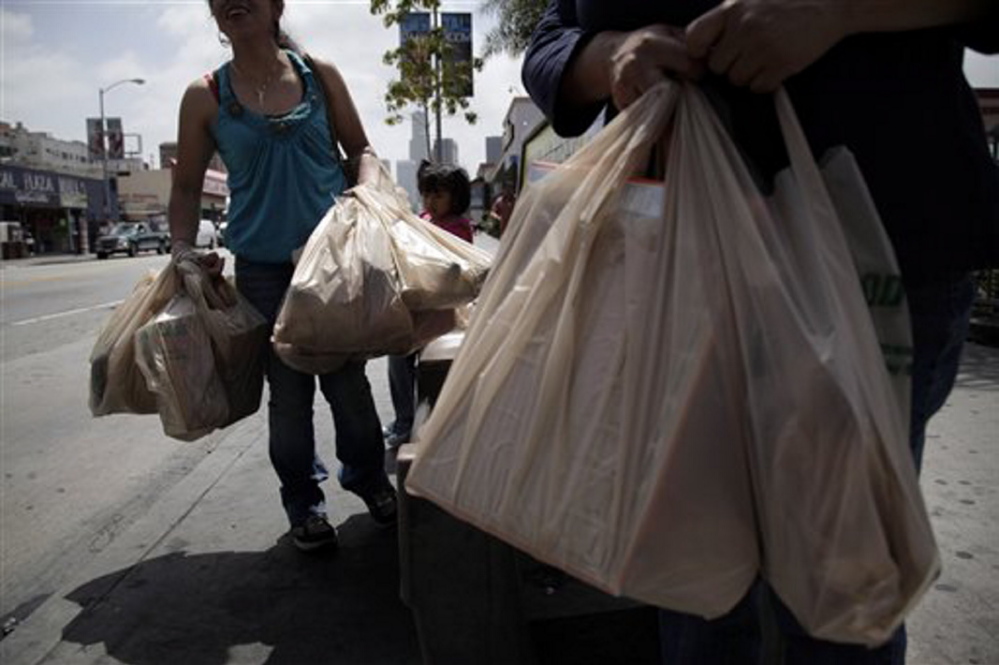Portland business owners and statewide trade groups showed up in force Wednesday to testify against proposals to ban plastic foam and assess a 10-cent fee on paper and plastic bags, prompting a City Council committee to postpone its vote.
During a public hearing at City Hall, the business groups, which held a sparsely attended news conference earlier Wednesday, urged the council’s Transportation, Sustainability and Energy Committee to focus on education and more practical litter reduction efforts, such as offering recycling containers with lids.
“The problem is not the product, it’s the people,” said John Wheeler, who represented C.N. Brown convenience stores.
Barbara Anania, who owns two Anania Variety Stores in Portland and one in South Portland, said the proposals would cause price increases for consumers, who can’t afford them and would shop elsewhere.
“The middle class doesn’t have enough money to support these new ordinances,” Anania said.
Several residents and environmentalists urged the committee to vote to endorse the proposals as a way to deter litter and protect the environment and wildlife.
“No one is paying me to be here,” said Sally Trice, a resident. “I am here because our kids are depending on us to pass these ordinances. We cannot just sit here and look at today’s bottom line. That is extremely shortsighted.”
Wednesday’s was the first public hearing on the disposable-bag fee, so testimony centered largely on that proposal. Businesses would have to collect the fee, but give 60 percent of the revenue to the city.
The fee would affect grocery stores, convenience stores, pharmacies, restaurants, dry cleaners, farmers markets and other retailers, although even some supporters recommended exempting dry cleaners.
The committee is still struggling with a proposal to ban plastic foam that’s used to make coffee cups, takeout containers and plates. Last year, the City Council referred it back to the committee for further study.
Both proposals were recommended by a special task force. The votes were split among environmentalists, who supported the proposals, and business and industry groups, which opposed them.
More than 100 ordinances in 17 states and the District of Columbia ban plastic bags or impose fees on them, according to the Surfrider Foundation, a California-based environmental group that is advocating for stricter rules in Portland.
Glen Brand, director of the Sierra Club Maine Chapter, described the ordinances as “common sense” approaches to protecting the environment. Plastic bags are easily blown into waterways, where they can choke marine wildlife such as turtles, whales, seals, birds and fish, he said.
“Together, the waste reduction ordinances will help consumers and businesses to reduce unnecessary and expensive litter and waste,” Brand said. “The plastic bag fee will encourage Portland residents to use simple, practical alternatives such as affordable, reusable shopping bags, which are widely available in the city.”
Andy Charles, who owns Haven’s Candies, said the ordinances would add costs in Portland, where his store doesn’t perform as well as his stores in Westbrook and Scarborough.
Charles estimated it would cost as much as $1,000 to reprogram his registers in Portland to itemize the new fee. Employees would need additional training, and administrative policies would be needed to ensure that the store complied with the ordinances, he said.
“It’s going to take years and years before I recover that cost – if at all,” Charles said, lamenting that businesses would keep only 40 percent of the fee.
Steve DiMillo, owner of DiMillo’s on the Water, said the fee would not change consumers’ behavior.
“You can’t tax stupid,” he said. “You just can’t keep beating up on businesses in Portland.”
Shelley Doak, executive director of the Maine Grocers and Food Producers Association, railed against both ordinances, taking a particularly strong stance against the bag fee.
“This proposal would be the most expansive and aggressive tax in the country,” she said.
Doak became less sure of that claim under questioning by Councilor Jon Hinck.
“Basically, if you could back up your testimony I’d appreciate it,” said Hinck, who supports the fee. “I do think economics show if you get things for free, you allow them to proliferate.”
Councilor Kevin Donoghue said he was conflicted by the proposal, even though he believes the use of plastic bags should be discouraged. He also questioned whether small businesses could properly collect the fee and whether the city could enforce it.
“I’m not a fan of the approach of a bag fee,” Donoghue said.
Councilor Cheryl Leeman was critical of both the foam ban and the bag fee.
“I’m not struggling with this issue at all,” she said of the bag fee. “I don’t support it in any form.”
Randy Billings can be contacted at 791-6346 or at:
rbillings@pressherald.com
Twitter: @randybillings
Send questions/comments to the editors.




Comments are no longer available on this story